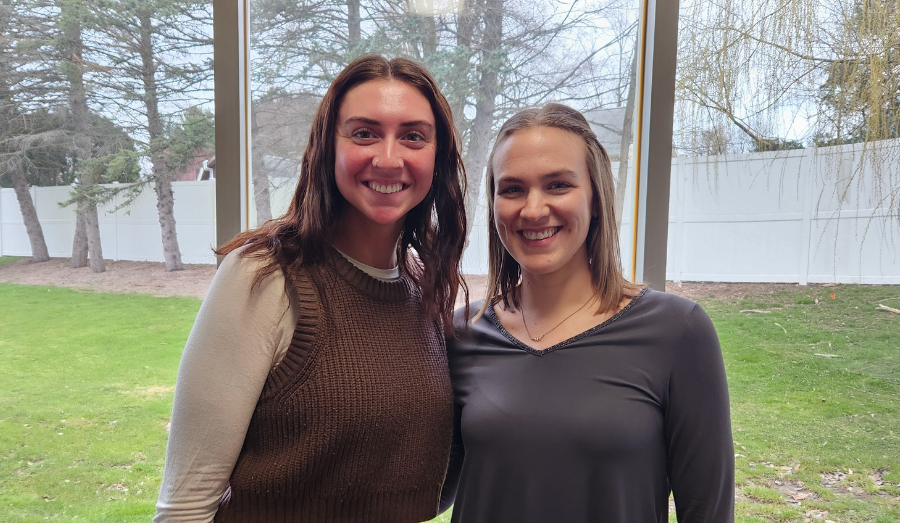Eating Disorder Admissions All-Star Team: Responsibilities and Rewards
The friendly faces of the eating disorders admissions team, Erin McDowell and Christy Smith, at Sanford West Behavioral Health Campus!
At Sanford Comprehensive Treatment for Eating Disorders, we are proud of how we have evolved since we opened the first standalone residential treatment center for eating disorders in Michigan. Our residential program is now two years old. Over the past two-plus years, we have also developed day programs and partial day programs for eating disorders, serving 14+ and all gender identities. Those in our eating disorder programs maintain the same individual therapist through all levels of care. So, it is a very close integrative team. Psychiatrists, physicians, psychiatric nurse practitioners, dietitians, therapists, nurses, and recreational therapists are all part of the care team. Additionally, we have just announced our Virtual Programs for Eating Disorders, rounding out the full continuum of care.
Eating Disorder Admissions All-Star Team
One of the team’s components is often unsung, and we would like to rectify that. Our eating disorders admissions team is worthy of attention and accolades. They are often the very first person to hear that a caller has an eating disorder. We sat down with Erin McDowell and Christy Smith, MSW, to talk about the responsibility and rewards of being the voice at the other end of the phone.
SBH – Could you tell us about your job? What do you do at Sanford?
Erin McDowell – My job title is eating disorder access counselor. Our work is about helping people connect with care. So, whether they admit to Sanford Behavioral Health or not, we are often the first person that somebody talks to about their eating disorder. We can give them a better idea of what’s out there for treatment. We are gatekeepers with a wealth of information and knowledge to share about eating disorders and available care.
Christy Smith—We also get a lot of calls from people who do not know what level of care they should access, so we are their resource to find out where to start. Is it outpatient, inpatient, or hospitalization? We guide people to the appropriate level of care based on criteria in a phone assessment. I also have my MSW and facilitate groups at all levels. I will be implementing the virtual outpatient programs starting in May, so I have direct contact with people we have spoken to on the phone.
SBH, what type of calls do you get in admissions? Do people ask if we are a weight loss clinic?
Erin McDowell – When I tell people that I am an eating disorder access counselor or that I work in admissions for an eating disorder facility, the first question I get from anybody who doesn’t really have much experience with eating disorders is, “Is that for somebody who eats too much or too little.?” And my answer is always, “Both with so many other factors.” There is not very much education out there. Sometimes, our job is to educate a parent on what behaviors might be part of their child’s eating disorder if they suspect their child has one. It’s about 50/50 individual callers versus family members. We also get calls from doctor’s offices if a referral is required.
It can be parents calling in and asking us questions about what sort of services we offer. We can use that opportunity to educate them on eating disorders. Sometimes, we’ll send resources about different eating disorders to families or individuals. Atypical anorexia needs a lot of explanation. It is hard to process that someone can have anorexia and be in a larger body; we get many questions about that.
Christy Smith – We often get phone calls with the diagnosis of binge eating disorder. Callers tend to frame it as a “food addiction,” which seems rooted in diet culture and shows a lack of awareness. The fact is, our society doesn’t know about eating disorders and how they affect everyone. We see people who come to us because they want to lose weight and be smaller. And they have come to the right place, but we are not a weight loss clinic.

Sanford West Behavioral Health Campus
SBH – What is the turnaround time from phone call to admittance?
Erin McDowell – The admissions process takes longer than, for example, the substance use disorder admission process. If there are medical complexities, we may have to wait for medical records. Our clients go through an hour-long assessment if they are not stepping down or transferring from another facility. That needs to be scheduled. So, it potentially would happen the next day. However, it can take weeks or even months, especially with a normalized diet culture. Many eating disorders present normally in society and are actually praised, so there can be hesitation. However, by the time someone contacts us, their quality of life has been impacted, and often, it has gotten to an unbearable point before they reach out.
SBH – Do you get excuses to put off coming to treatment? Do you meet the people you have spoken with in person?
Christy Smith – We get excuses, but ambivalence is a part of an eating disorder. So, you might know you have a problem but are happy with your smaller body size. And because it is so normalized, the person might be getting positive attention. So why would one try to fix this? Eating disorders begin to meet a set of needs, and in the mind of someone with an eating disorder, recovery can equal unmet needs. It’s interesting because l facilitate group therapy at all levels of care and meet people I’ve talked to on the phone who are processing the things we spoke about.
Erin McDowell – I don’t know if I would call it an excuse, but something we run into is having to explain to a person that they are “sick enough” – that they need a higher level of care or need care at all. An eating disorder might tell you that you aren’t sick enough for treatment. It’s like they failed their eating disorder because they didn’t meet a goal or can’t go without food 24/7. Or the person is in a larger body, and they don’t present like the picture they have of a “normal” eating disorder client. So they don’t think that they need help.
However, only 6% of people being treated for an eating disorder are in a medically underweight body. It is normal to see someone struggling with an eating disorder that might not be present in a medically underweight body. That certainly doesn’t take away the danger of engaging in these behaviors. It is still just as necessary to seek treatment.
When an individual has medical complexities where we need to get other medical records or we need to communicate with different members of their care team, it can take time to wait for approval. We communicate daily and keep them updated. Of course, getting to meet them once they enter treatment is rewarding. The first step for admissions when they arrive for their intake would be to meet with us. We get to be the first person to explain what will happen on admission day, finish their paperwork, and prepare them for what else is going to happen.
SBH – Please talk about co-occurring disorders.
Erin McDowell – It is more common than not that someone with an eating disorder would have a co-occurring mental health diagnosis. For example, 1 in 5 people with an eating disorder will develop a substance use disorder in their lifetime. It could be depression, anxiety, OCD, bipolar disorder, borderline personality disorder, etc.
Christy Smith – At Sanford, with co-occurring disorders, they usually start with a substance use disorder team and then are referred to us if they potentially have an eating disorder. In that case, Erin and I would do an assessment for eating disorder behaviors. With co-occurring disorders, individuals are just trying to meet their needs. So, once an eating disorder or substance use disorder is under control, the body and mind work together to try to get those needs met again. So something else might develop, like OCD or an eating disorder, if you came to us with a substance use disorder. The person might be trying to get some relief from anxiety, intrusive thoughts, and depression. Sometimes, it is hard to determine which comes first. This is why it’s so nice to have a multidisciplinary team under one roof so that those behaviors can all be managed in one place.
SBH – How does family play a role?
Erin McDowell—Having a strong support system can be helpful and improve outcomes. You can recover without having a supportive family if you know how to handle tough situations and advocate for yourself. Still, family or loved ones’ support can be a huge asset.
Christy Smith – We have a virtual family program for the loved ones of our clients because family does play a role. No one develops an eating disorder in a bubble. Family plays a huge part in how people develop an eating disorder and can be the direct consequence of family members. So, in order to recover, you do have to address how your family impacted the development of your eating disorder. The family was the topic of conversation in our group yesterday. We talked about interacting with family but setting boundaries and educating them about eating disorders. I wish it were easy, but it’s so ingrained in our society that it is an ongoing practice.
SBH – What is fun about your job?
Erin McDowell – I like Christy! [laughs] We are trying to help people. And for me, working with this population has helped to solidify my recovery. So, being able to help people has helped me. I didn’t know whether or not I wanted to work with eating disorders. It was something I was passionate about. I had experience with eating disorders, but it was interning at Sanford under Dr. Flores that made me realize that passion and experience were a good thing, and it made the job that much more rewarding.
Christy Smith—I like connecting during assessments. I just finished an assessment, and this person was struggling. They were crying on the phone, and I felt like maybe I could do something to help. It just feels good and reiterates that I’m in the right field and that this is what I want to do.
SBH – Challenges?
Erin McDowell – Barriers to treatment! Insurance, not being able to accept someone, and the care deserts in Michigan where we can’t even give them referrals.
Christy Smith – Lack of resources in Michigan. While we try to be as kind and empathetic as possible in eating disorder admissions, the reality is that there’s not enough care, and there are not enough places to accept Medicaid.
SBH – This brings us to our new virtual intensive outpatient programs. How will they help with eating disorder admissions?
Christy Smith – The great news about our virtual programs is that they allow us to reach more people. If you take the Upper Peninsula (UP), for example, there’s a lack of community mental health, mental health facilities, counselors, and certainly psychiatrists. In the rural UP, drives can take 10 hours to get to a city with resources, depending on where you live. And there is the weather. Our virtual programs can give those people access to care and our entire behavioral health campus remotely. I also think that the way our world is turning is virtual. After COVID, things definitely progressed toward telehealth. People show up for virtual appointments because they don’t have to worry about transportation and can continue their responsibilities.
Erin McDowell – In admissions, we have been talking more about meeting people where they’re at. So if someone isn’t willing to quit their job or take a leave of absence, or if someone can’t take themselves out of school and they don’t want to pause their life, we need to meet them where they’re at and take a step towards wellness with them. They can always step up to more comprehensive programs. Coming to treatment at the least restrictive level of care still means they make a connection with an individual therapist. Feeling safe and comfortable with the Sanford team allows someone to discuss higher levels of care if needed.
Thank you Erin and Christy!
If you or a loved one is struggling with addiction, eating disorders, or co-occurring mental health conditions, don’t wait to change your life – click the link below to speak with an admissions specialist.






